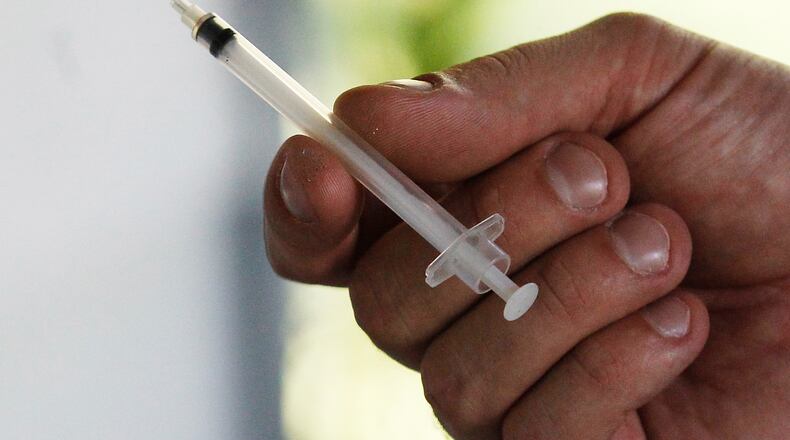READ MORE: DeWine: ‘Never seen anything like’ drug crisis hitting Ohio
“It’s a move in the right direction but we want to see some action,” said Melanie Silvus, the director of the Clark County chapter of the Families of Addicts organization.
While an emergency was declared by Trump on Thursday, it doesn’t mean “the faucets are turning on and there’s money running to Clark County already,” Health Commissioner Charles Patterson said.
“It’s a beginning,” he said. “We’ve planted our flag in the ground and said, ‘From this point forward, we’re going to work on this.’ But that means it’s going to take awhile for this to all flow down hill.”
RELATED: New program seeks to reach Clark County overdose patients sooner
As a result of the public health emergency declaration, access will be expanded to telemedicine services, including substance abuse treatment for people living in rural and remote areas.
State and federal workers will be able to be deployed more easily and U.S. Department of Labor grants for the unemployed will have greater access. It also will shift funding for HIV/AIDs programs to provide more substance abuse treatment for people already eligible for those programs.
Trump also directed other departments and agencies to exercise their own available emergency authorities to address the crisis.
MORE COVERAGE: Demand for, debate over Narcan soars in Springfield
Nearly 500 people have died of drug overdoses in Clark County since 1998, according to coroner’s office records. More than half of those people — 265 — died between 2012 and 2016, the result of the opioid epidemic. Last year, the county saw a then-record 79 drug deaths.
The federal government also can control the flow of illegal narcotics in the country, Patterson said.
“As the price goes up, it will help keep folks from starting,” he said. “That may help some people decide they’re going to seek treatment because it’s not as easy to get and it’s not as inexpensive.”
The long-term key to solving the problem is education, Patterson said. In his speech, Trump said he wants to spend money to educate young people so they won’t start using drugs.
SOCIAL MEDIA: FOLLOW REPORTER MICHAEL COOPER ON FACEBOOK AND TWITTER.
“It’s the No. 1 way to combat this for the future,” Patterson said.
The Botvin Like Skills program has recently been introduced at both Tecumseh and Southeastern local schools this year. Federal money could be used to help enhance those efforts, Patterson said.
“It’s a program that has a track record and positive outcomes in this area,” he said.
Trump also said he wants to remove a federal regulation that allows for a maximum of 16 beds at a treatment facility. Addicts often want to get treatment, Silvus said, but can’t find an opening at a treatment center and have to be put on a four- to six-week waiting list.
“It would be great to see more treatment facilities and it would be great for those who don’t accept Medicaid or CareSource or state insurance that they start accepting it so those people can get into treatment,” Silvus said.
SPRINGFIELD’S OPIOID WAR
‘Perfect’ Springfield couple battles addictions, finds recovery
Springfield native living clean, successful after prison, addiction
Addicts, family members share stories at Springfield recovery banquet
More prevention needed to curb opioid epidemic in Springfield
New program seeks to reach Clark County overdose patients, save lives
Safe h ouses for Springfield overdose patients might save lives
Drug epidemic wreaking havoc on Clark County businesses, economy
Drug crisis traumatizing children in Clark County, state
Money used to fight Clark County drug crisis at risk
More than 100 Clark County law enforcement officers to get Narcan kits
Springfield examines officer, medic safety after Ohio police overdose
20 more overdoses in Clark County during 25-hour stretch
Clark County sees another big spike of at least 40 overdoses in 5 days
Clark County leaders pledge to fight addiction stigma, OD crisis
Clark County to charge addicts who OD and don’t seek treatment
Overdose epidemic spreads, strains Springfield first responders
Clark County drug overdoses double in 24-hour spike
By the numbers
97: Unconfirmed, suspected drug deaths so far this year, a record number*
82: Confirmed drug deaths in 2017
79: Confirmed drug deaths in 2016
Source: Clark County Coroner's Office
* Total as of Oct. 10
ABOUT THIS SERIES
The Springfield News-Sun has written extensively about opioid and drug problems in Clark County in the past five years, including stories about multiple overdoses in one weekend and efforts to expand treatment options. This year, the News-Sun will take a deep dive into the community’s drug epidemic and what local leaders are doing to solve the problem.
About the Author

